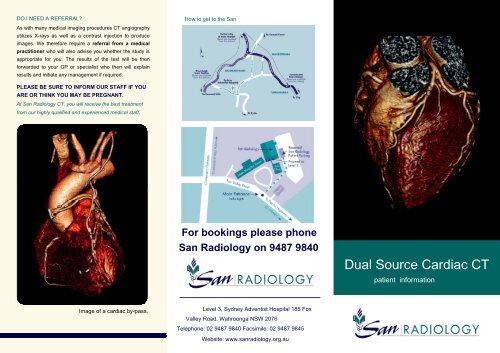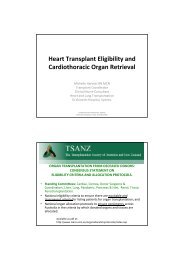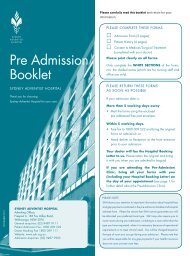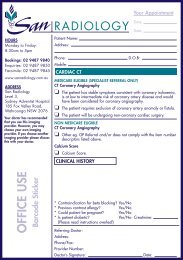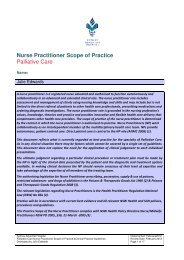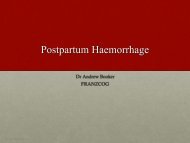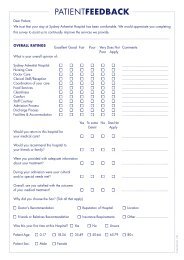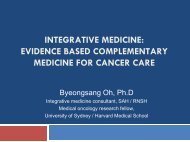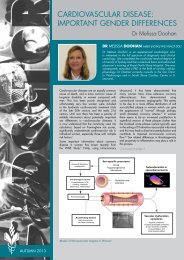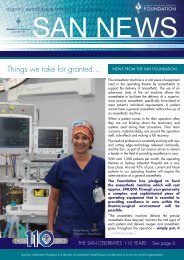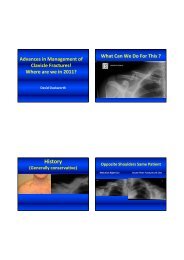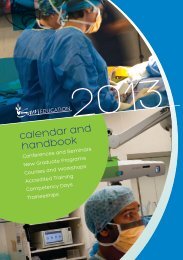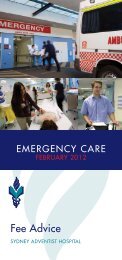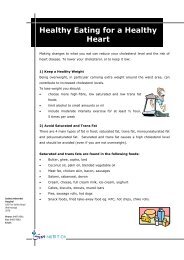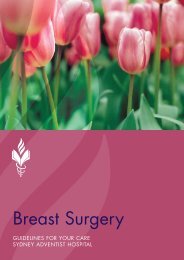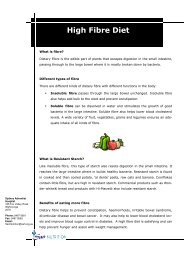Cardiac CT Patient Information Brochure - Sydney Adventist Hospital
Cardiac CT Patient Information Brochure - Sydney Adventist Hospital
Cardiac CT Patient Information Brochure - Sydney Adventist Hospital
You also want an ePaper? Increase the reach of your titles
YUMPU automatically turns print PDFs into web optimized ePapers that Google loves.
DO I NEED A REFERRAL<br />
As with many medical imaging procedures <strong>CT</strong> angiography<br />
utilizes X-rays as well as a contrast injection to produce<br />
images. We therefore require a referral from a medical<br />
practitioner who will also advise you whether the study is<br />
appropriate for you. The results of the test will be then<br />
forwarded to your GP or specialist who then will explain<br />
results and initiate any management if required.<br />
How to get to the San<br />
PLEASE BE SURE TO INFORM OUR STAFF IF YOU<br />
ARE OR THINK YOU MAY BE PREGNANT.<br />
At San Radiology <strong>CT</strong>, you will receive the best treatment<br />
from our highly qualified and experienced medical staff.<br />
For bookings please phone<br />
San Radiology on 9487 9840<br />
Dual Source <strong>Cardiac</strong> <strong>CT</strong><br />
patient information<br />
Image of a cardiac by-pass.<br />
Level 3, <strong>Sydney</strong> <strong>Adventist</strong> <strong>Hospital</strong> 185 Fox<br />
Valley Road, Wahroonga NSW 2076<br />
Telephone: 02 9487 9840 Facsimile: 02 9487 9845<br />
Website: www.sanradiology.org.au
FAQs:<br />
Dual Source<br />
<strong>Cardiac</strong> <strong>CT</strong><br />
HOW IS DUAL SOURCE CORONARY<br />
<strong>CT</strong> ANGIOGRAPHY DIFFERENT<br />
FROM EXISTING TECHNOLOGY<br />
Australia’s first Dual Source <strong>CT</strong> has two x-ray tubes<br />
instead of one and is able to generate up to 128 slices<br />
per rotation. This allows hundreds of images to be<br />
produced within a single short breath hold.<br />
The high speed of the scanner allows us to completely<br />
“freeze” heart motion, therefore giving more accurate,<br />
motionless images. There is also no longer a need to give<br />
patients medication to slow down the heart rate (known as a<br />
beta-blocker) as was necessary with older single source<br />
technology, including 64-320 slice scanners. The scan is<br />
per- formed during a small injection of x-ray contrast (“dye”)<br />
into a vein in the arm and uses the most advanced radiation<br />
dose-reduction techniques currently available.<br />
WHAT IS A CORONARY <strong>CT</strong> ANGIOGRAM<br />
STUDY USED FOR<br />
1. To Assess High-Risk Heart Disease <strong>Patient</strong>s<br />
For example:<br />
• Men aged 45 and over with a family<br />
history of heart disease<br />
• Women aged 55 and over with a family<br />
history of heart disease<br />
• Current or previous smokers<br />
• Individuals who are overweight and/or have<br />
high cholesterol.<br />
Coronary <strong>CT</strong> Angiography can gauge the actual disease<br />
state of arteries and characterise the plaque within the<br />
artery rather than merely assessing an index of risk. The<br />
findings may then guide further investigation and treatment<br />
options.<br />
If your Coronary Artery <strong>CT</strong> is normal you can be confident<br />
that your coronary arteries are all clear, even if you have a<br />
strong family history of heart disease.<br />
2. Atypical Chest Pain Assessment<br />
Not all chest pain is due to heart disease. Often patients<br />
will have had a number of other tests that may have been<br />
inconclusive. Our Coronary <strong>CT</strong> Angiography studies are<br />
able to rule out coronary artery disease as the cause of<br />
chest pain and also may be able to identify other causes for<br />
the patient’s symptoms.<br />
3. Following <strong>Cardiac</strong> Surgery or Intervention<br />
It is a known fact that up to 40% of vein grafts and 10% of<br />
artery grafts fail within the first 10 years following surgery.<br />
Our cardiac scans can confirm that the bypass grafts are<br />
still working and whether the underlying disease has<br />
progressed.<br />
Although older single source <strong>CT</strong> technology allowed us to<br />
do this to some degree, we can now perform these scans<br />
with much higher accuracy at any heart rate and on<br />
patients with irregular heart rhythms. Some coronary artery<br />
stents may also be assessed using this technology.<br />
HOW LONG DOES THE SCAN TAKE<br />
The scan itself only takes around 6-15 seconds, depending<br />
on the patient’s heart rate. <strong>Patient</strong>s will spend<br />
approximately 15 minutes in the scan room including<br />
planning scans.<br />
HOW MUCH DOES A SCAN COST<br />
The cost of the scan is currently not Medicare rebateable. A<br />
submission for a rebate has been made to the Health Care<br />
Commission, but we are not currently aware of if and when a<br />
rebate will be approved. Please phone San Radiology bookings<br />
on 9487 9840 for enquiry regarding fees for this scan.<br />
WHAT HAPPENS AFTER THE EXAMINATION<br />
When your scan is completed, our technologists will produce<br />
your images from the volume of data obtained. One of<br />
our radiologists specialised in cardiac imaging will then<br />
interpret the images obtained. Depending on the complexity<br />
of the findings, the time taken for analysis may vary. The<br />
results will then be forwarded to your doctor.<br />
Please advise our radiographer about your follow-up<br />
appointment with your referring physician.<br />
ARE THERE ANY PRECAUTIONS I SHOULD<br />
BE AWARE OF<br />
When you are making your appointment you will be questioned<br />
about ANY medications that you are currently taking.<br />
For some cardiac <strong>CT</strong> studies it is necessary to cease certain<br />
medications prior to undergoing your scan. These medications<br />
include Viagra, Levitra & Cialis and must be stopped for<br />
3 days prior to your appointment. You will be given all<br />
relevant details regarding preparation for the test by our<br />
bookings staff when you make your appointment.<br />
HOW CAN YOU HELP<br />
To obtain best image quality, it is necessary for you to<br />
hold your breath for up to 15 seconds. You will also be<br />
asked to fill in a consent form for the administration of the<br />
x-ray contrast (dye) injection that is necessary to highlight<br />
the blood vessels in the heart.<br />
Please talk to our bookings staff, who will give you detailed<br />
information about how to prepare for the examination.<br />
Please consult your physician beforehand concerning any<br />
allergies, and be sure to let the <strong>CT</strong> team know of your<br />
existing allergies and medications prior to undergoing<br />
your examination.


